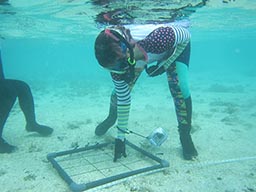- ABOUT US
- PROGRAM AREAS
- CONSERVATION APPROACH
- EDUCATION
- MULTIMEDIA
Coral Housekeepers in the Atlantic Basin
This infographic describes how fish affect coral reef ecosystems.
Infographic credit: Madison Gard, Hollings Scholar and Tauna Rankin, NOAA CRCP Fisheries Lead

Infographic Transcript: Coral Housekeepers in the Atlantic Basin
In the Atlantic, fish need healthy coral reefs and coral reefs need healthy fish populations. Managed fishery species rely on reef systems for food and shelter. In the same way people care for their homes, fish maintain coral reef ecosystems.
Cleaning/Herbivores
Algae compete with corals for space. They grow rapidly to crowd out or smother coral neighbors. Herbivores, like parrotfish and surgeonfish, clean coral reefs like housekeepers by eating algae. This creates space for corals to settle and grow.
Fertilization/Nutrients
All fish within a coral reef assist with nutrient cycling. Grunts, damselfish, and other foragers that eat away from the reef excrete new nutrients into the reef system when they return. The extra nutrients enhance coral growth, similar to how people fertilize gardens to help them grow.
Pest Control/Corallivores
Unchecked populations of corallivores, such as the bearded fireworm, are harmful to coral reefs. They eat corals, spread disease, and degrade reef structure. Grunts, triggerfish, and wrasse act like exterminators by eating coral pests to control their populations.
Shelter/Reef Structure
A healthy reef is home to many species of coral that build and maintain the reef structure. Corals provide places for small fish to hide and attract big fish searching for food. In the same way that a high-rise apartment building in a bustling city can house many families, a large, healthy reef supports a diverse and abundant fish community.
About Us

The NOAA Coral Reef Conservation Program was established in 2000 by the Coral Reef Conservation Act. Headquartered in Silver Spring, Maryland, the program is part of NOAA's Office for Coastal Management.

The Coral Reef Information System (CoRIS) is the program's information portal that provides access to NOAA coral reef data and products.
Work With US
U.S. Coral Reef Task Force
Funding Opportunities
Employment
Fellowship Program
Contracting Assistance
Graphic Identifier
Featured Stories Archive

Access the archive of featured stories here...
Feedback
Thank you for visiting NOAA’s Coral Reef Conservation Program online. Please take our website satisfaction survey. We welcome your ideas, comments, and feedback. Questions? Email coralreef@noaa.gov.
Stay Connected
Contact Us
NOAA’s Coral Reef Conservation Program
SSMC4, 10th Floor
1305 East West Highway
Silver Spring, MD 20910
coralreef@noaa.gov
